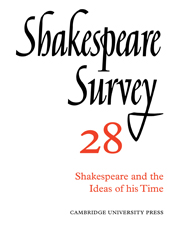Book contents
- Frontmatter
- ‘Richard II’ and the Realities of Power
- The Politics of Corruption in Shakespeare’s England
- Literature without Philosophy: ‘Antony and Cleopatra’
- Self-consciousness in Montaigne and Shakespeare
- ‘Measure for Measure’: The Bed-trick
- Shakespeare and the Doctrine of the Unity of Time
- ‘Coriolanus’ and the Body Politic
- ‘Titus Andronicus’, iii, i, 298–9
- ‘The Merchant of Venice’ and the Pattern of Romantic Comedy
- The Integrity of ‘Measure for Measure’
- ‘To Say One’: An Essay on ‘Hamlet’
- ‘The Tempest’ and King James’s ‘Daemonologie’
- Sight-lines in a Conjectural Reconstruction of an Elizabethan Playhouse
- The Smallest Season: The Royal Shakespeare Company at Stratford in 1974
- The Year's Contributions to Shakespearian Study 1 Critical Studies
- 2 Shakespeare’s Life, Times, and Stage
- 3 Textual Studies
- Index
- Plate section
‘Coriolanus’ and the Body Politic
Published online by Cambridge University Press: 28 March 2007
- Frontmatter
- ‘Richard II’ and the Realities of Power
- The Politics of Corruption in Shakespeare’s England
- Literature without Philosophy: ‘Antony and Cleopatra’
- Self-consciousness in Montaigne and Shakespeare
- ‘Measure for Measure’: The Bed-trick
- Shakespeare and the Doctrine of the Unity of Time
- ‘Coriolanus’ and the Body Politic
- ‘Titus Andronicus’, iii, i, 298–9
- ‘The Merchant of Venice’ and the Pattern of Romantic Comedy
- The Integrity of ‘Measure for Measure’
- ‘To Say One’: An Essay on ‘Hamlet’
- ‘The Tempest’ and King James’s ‘Daemonologie’
- Sight-lines in a Conjectural Reconstruction of an Elizabethan Playhouse
- The Smallest Season: The Royal Shakespeare Company at Stratford in 1974
- The Year's Contributions to Shakespearian Study 1 Critical Studies
- 2 Shakespeare’s Life, Times, and Stage
- 3 Textual Studies
- Index
- Plate section
Summary
The incidents in Coriolanus which reflect the Midlands riots of 1607 and the parliamentary quarrels of 1606 are well known. Less obvious perhaps is the place of these topical echoes of contemporary troubles in the larger orchestration of the play. Topical references on their own do little more than date the play, in both senses of the word.
A fresh look at the belly fable and how Shakespeare sets it out at the beginning of the play might help to clarify where the food riots and the jibes at Yelverton and Hyde as tribunes of the people fit in the larger pattern. Both topical events raised questions of power and authority by posing the problem of sectional interests in a commonwealth which was clearly less than organically united. Through his presentation in Coriolanus, I think, Shakespeare was exposing some basic anomalies in the belly fable's cognate concept, the body politic, which shaped traditional thinking about authority in the state.
The body politic had a long and respectable history, traceable back to Plato and Aristotle. Its substantive medieval version was the one analysed by Kantorowicz, the legal fiction of the king's two bodies, one the private flesh and one the politic body which never dies. In Tudor times Henry VIII promoted the more metaphysical idea of the whole state as a corporate organism, symbolised in parliament with the king as head and lords and commons as 'members', a concept which became the dominant one in the course of the century. Corporate sovereignty, the supreme authority of rex in parliamento, was written into the chief statutes of the Reformation Parliament.
- Type
- Chapter
- Information
- Shakespeare Survey , pp. 63 - 70Publisher: Cambridge University PressPrint publication year: 1975
- 6
- Cited by

